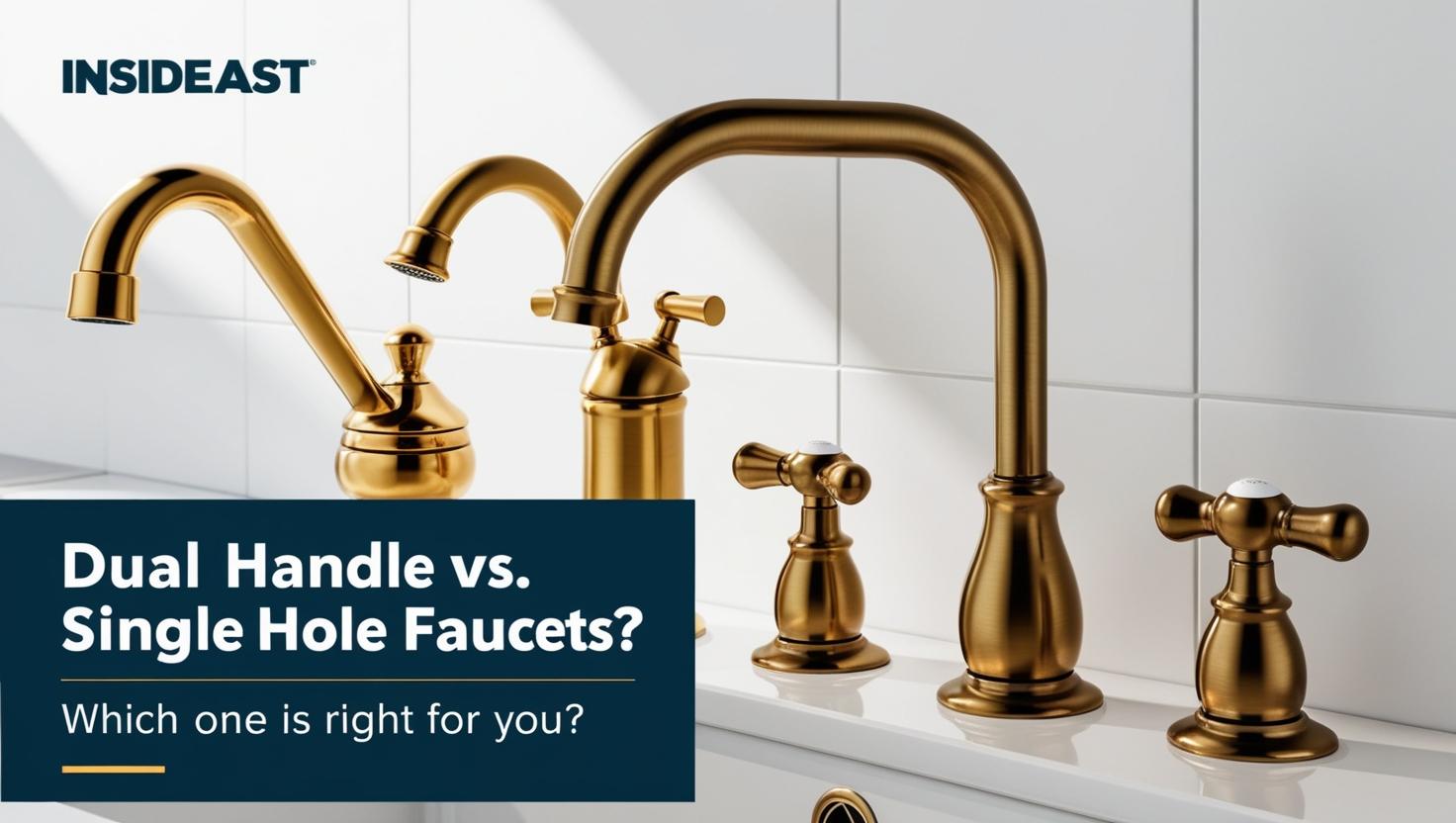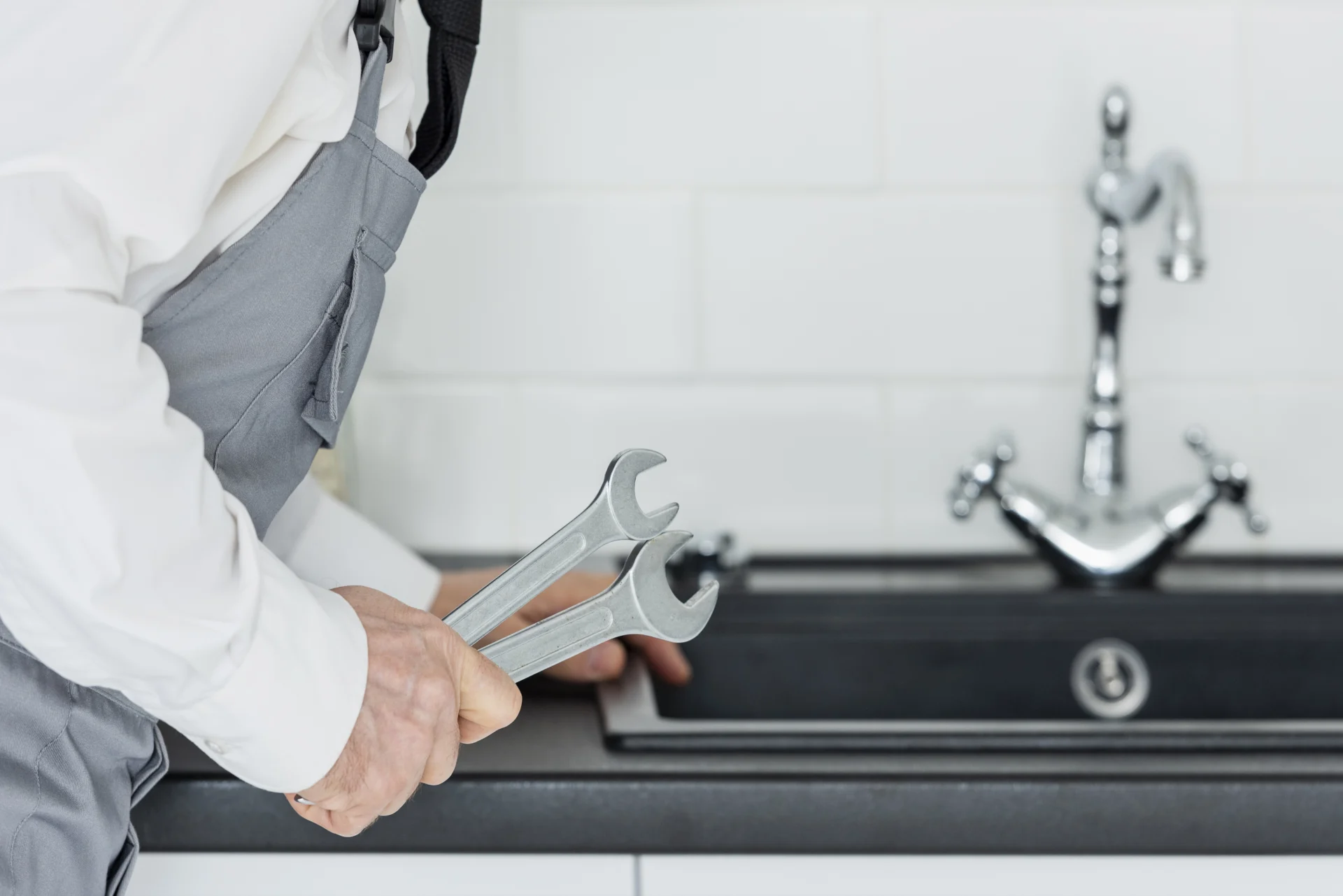
Dual-Handle vs Single-Hole Faucets: Which to Choose?
Choosing between a dual handle faucet and a single hole faucet may seem like a small decision but in bathroom

Choosing the right kitchen sink can be tough. You have two main options: undermount and drop-in sinks. This guide will make it easier to pick the right one for your kitchen.
Undermount sinks are popular for their sleek look. They attach under the countertop. Drop-in sinks sit on top with a visible rim. Your choice affects installation, cleaning, and your budget.
Choosing the right sink for your kitchen is more than just about style. The way it’s installed affects both how it works and looks. Let’s look at the two main types of sink installations and their features.

An undermount sink goes under the countertop. This gives a smooth look and uses space well. It needs special clips to be installed and works best with solid countertops like granite or quartz.
A drop-in sink fits into a hole in the countertop. It has a rim that shows and sits on the surface. These sinks are easy to install and fit many countertop types, including laminate.
When comparing sink types, several things matter:
Knowing these differences helps you choose the right sink for your kitchen’s needs and style.

Kitchen sink styles are key to your kitchen’s look. Choosing between undermount and drop-in sinks changes your kitchen’s look a lot.
Undermount sinks look sleek, making your kitchen look modern. They blend well with contemporary kitchens. The sink’s rim is hidden, letting your countertop stand out.
Drop-in sinks give a traditional feel. They have a visible rim that adds character. They fit many kitchen styles, from country chic to vintage.
Think about how the sink fits with your kitchen’s style. An undermount sink suits a minimalist kitchen. A farmhouse-style kitchen looks great with a drop-in sink.
Your sink choice affects your kitchen’s look and feel. Pick one that makes your kitchen look better overall.
Choosing the right sink for your kitchen is more than just about style. It’s also about how well the sink fits with your countertop. Different countertops need specific sinks to work well together.
Undermount sinks are great with solid surface countertops. Granite, quartz, and marble are perfect for these sinks. They are strong enough to hold the sink and look seamless.
Drop-in sinks can go on many countertops. You can use them with laminate or tile. This makes them a favorite for many homeowners.
Laminate and tile countertops need careful sink selection. They can get damaged by water, so drop-in sinks are safer. Undermount sinks are not usually recommended for these countertops because they’re harder to install and can cause problems later.
When you’re planning your kitchen remodel, think about your countertop. This will help you pick the best sink type. It ensures your kitchen looks great and lasts a long time.

Choosing between undermount and drop-in sinks is important. The installation process affects your choice between doing it yourself or hiring a pro. The difficulty and time needed to install a sink can guide your decision.
Drop-in sinks are easier to install, making them great for DIY projects. The steps are simple:
This easy method lets homeowners finish the job fast, without needing special tools.
Undermount sinks need more skill and precision. The steps include:
Many homeowners pick professional sink fitting for undermounts. This ensures the sink is well-supported and doesn’t leak.
The installation process affects cost and time. DIY can save money but might lead to expensive fixes later. Hiring a pro might cost more at first but ensures a solid and lasting installation.
A clean sink is key for a hygienic kitchen. Let’s look at sink cleaning tips and maintenance for drop-in and undermount sinks.
Drop-in sinks have a visible rim that catches dirt and grime. This part needs extra cleaning. Use a soft brush to clean around the edges and remove buildup. Regular cleaning stops stains and keeps your sink looking new.
Undermount sinks are easy to clean. You can wipe away debris right into the sink without the rim getting in the way. This design makes cleaning every day easy. Still, check the seam between the sink and countertop to stop grime from building up.
For a lasting shine, sinks need regular care. Undermount sinks might need new caulk every few years to keep a tight seal. Drop-in sinks should have their rim seal checked now and then. No matter the type, use gentle cleaners and avoid harsh materials to protect your sink.
By following these tips, you’ll keep your sink looking great for years. Remember, regular care is the secret to a clean and useful kitchen sink.
Planning a kitchen renovation means looking at sink prices. Drop-in sinks are usually cheaper than undermount ones. The price difference can be quite big, with undermount sinks costing 50% to 100% more.
But the cost doesn’t stop at the sink’s price. Think about these things when planning your budget:
Undermount sinks need special installation, which can increase costs. They often require stronger countertops and precise cuts. Drop-in sinks are easier to install and work well with more countertop types, making them a better choice for many people.
Even though undermount sinks cost more at first, they can increase your home’s value and improve your kitchen’s look. Consider these long-term benefits when deciding.
Choosing between undermount and drop-in sinks can be tricky. Let’s look at their pros and cons to help you decide for your kitchen.
Undermount sinks give your kitchen a sleek look. They make cleaning easy since dirt can’t get trapped. Plus, they give you more counter space for working.
However, undermount sinks are pricier. They’re harder to install and might not fit all countertops. If installed wrong, they can cause water damage.
Drop-in sinks are versatile and affordable. They’re easy to install and fit any countertop. This makes them a favorite for many homeowners.
The big downside of drop-in sinks is they take up more counter space. Cleaning around the rim is hard because dirt gathers there. They don’t have the modern look of undermount sinks.
When comparing sinks, think about your budget, countertop type, and how you like to clean. Both types have good points, so pick the one that suits your kitchen and lifestyle best.
Choosing the right sink can make your home more valuable and improve your kitchen’s use. Undermount sinks are a top choice for modern kitchens. They give your kitchen a sleek look that buyers love. This small change can greatly affect your kitchen upgrades.
A functional kitchen design is crucial for boosting your home’s value. Undermount sinks provide more counter space, making cooking easier. They also give your kitchen a luxurious look. These features can increase your home’s value when you sell.
Drop-in sinks have their own benefits for kitchen functionality. They’re simpler to install and fit with many countertop materials. This flexibility is great for homeowners wanting affordable kitchen upgrades.
The overall effect on home value depends on how well your sink matches your kitchen’s style. A thoughtful kitchen renovation, including the right sink, can greatly increase your home’s appeal and value.
Choosing the right kitchen sink can be a bit tricky. Undermount sinks offer a sleek look and easy cleaning. Drop-in sinks are more budget-friendly and match many countertops.
Your decision should depend on what’s important to you. Think about your budget, countertop type, and kitchen style. Also, consider sink installation tips before making up your mind. A good sink choice can make your kitchen both useful and nice to look at.
Undermount sinks go under the countertop for a smooth look. Drop-in sinks sit on top with a visible rim.
Drop-in sinks are simpler to install and can be done by yourself. Undermount sinks need more work and might require a pro.
Yes, undermount sinks are easier to clean because you can sweep debris right into them. But, the seam where the sink meets the countertop can get dirty over time.
Solid surfaces like granite, quartz, or marble work well with undermount sinks. Avoid laminate or tile because they can be damaged by water and are hard to install with undermount sinks.
Yes, drop-in sinks are cheaper than undermount sinks. This includes the sink and the cost to install it.
Undermount sinks might not change your home’s resale value much. But, they are seen as a luxury feature in designer kitchens. This can make your kitchen renovation look better.
Undermount sinks use more counter space by not having a visible rim. Drop-in sinks take up more space because of their rim.

Choosing between a dual handle faucet and a single hole faucet may seem like a small decision but in bathroom
Receive your order to your door address anywhere in the world using our shipping partners
You're covered by our 30 days return policy
Big part of our reviews testifies about the quality of support provided
Secured payments using renowned payment gateways